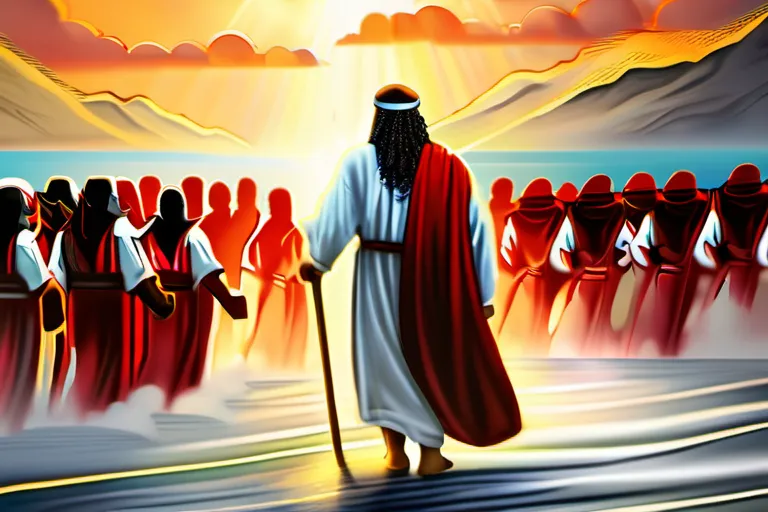Explore the life, leadership, and legacy of Moses in Jewish history.
Moses, a central figure in Judaism, led the Israelites out of slavery in Egypt and received the Ten Commandments from God. This article delves into his life, leadership, and enduring impact on Judaism.
Moses’ Early Life
Imagine being born under a starry sky, only to be whisked away into another world, where your destiny is shaped by royal orders and whispers of fate. Moses, the man who would lead his people out of slavery, had quite the unconventional start.
‘How can a baby’s cry, hidden in a basket, change the course of history?’ One day, in the city of Egypt, a new Pharaoh rose to power, fearing the growing Hebrew population. As Moses’ mother watched her son being placed into a basket and sent down the Nile, she must have wondered if he would ever find his true path.
- In Egypt, Moses was raised as a prince, shielded from the harsh realities of the Hebrews’ plight. He lived in splendor, unaware that outside these walls lay a world of suffering and oppression.
- But fate had other plans for this royal child. When he grew older, Moses found himself drawn to the lives of his people, witnessing their struggles and injustices firsthand. Could it be that the boy who once held all the privileges of royalty was destined to become a liberator?
- The journey from a pampered prince to a humble shepherd marked a profound transformation. ‘Was Moses simply following a personal curiosity or was he guided by something greater?’
From his early life, it’s clear that Moses’ story is not just about him; it’s about the intricate web of fate, choice, and divine intervention that intertwines to shape one of history’s most pivotal figures. As we delve into the events leading up to his call, we’ll see how these experiences prepared Moses for a destiny beyond his wildest dreams.
‘Who is Moses in Judaism?’ The answer lies not just in the man himself but in the way his life and actions have echoed through time, inspiring countless individuals to seek freedom, justice, and purpose.
The Call of Moses
Imagine being called to lead a people into the unknown, where every step could mean life or death. Such was the case for Moses, as he stood before a burning bush that refused to be consumed by the flames. Was it divine intervention, a mere trick of the sun, or perhaps just another sign in an endless sea of signs? The voice that spoke to him from within the bush was unmistakable: ‘Take off your sandals; you are standing on holy ground.’ This simple instruction, along with the command to deliver the Israelites from their bondage in Egypt, marked a turning point not just for Moses, but for all future generations.
But who was this man, and why was he chosen? Born to Hebrew parents in a time when they were persecuted by the Egyptians, Moses grew up in the very household of Pharaoh himself. Yet, his early life was marked by a series of dramatic events: the murder of an Egyptian taskmaster, the rescue of a slave girl named Zipporah, and the unexpected exodus from Egypt. Each event seemed to foreshadow the leadership skills he would need for what lay ahead.
Now, standing before that burning bush, Moses was confronted with his destiny. Was he ready to leave behind his life of comfort and security in Pharaoh’s court? Would he accept the burden of leading a people out of slavery into freedom? The question hung heavy in the air, like a cloud of uncertainty over a mountain pass.
Moses’ response was not immediate; it took time for him to process the enormity of what lay ahead. But as he looked upon that bush, glowing with the presence of God, something shifted within him. He couldn’t ignore the call any longer. It was then that Moses realized his true purpose: to be the voice of a people, to lead them out of darkness into light.
Moses and the Exodus
Imagine a journey, a grand exodus that began not just with a physical escape but a spiritual transformation. Who is Moses in Judaism? He is the leader who guided the Israelites out of slavery and into freedom, a story that resonates through generations.
The Ten Plagues are like a crescendo in this epic saga. Each one was a challenge, a test of faith, and a demonstration of God’s power. Wasn’t it Moses who stood before Pharaoh, his staff turning into a serpent, the river of Nile becoming blood? These plagues were not just acts of nature gone awry but a series of miracles designed to show that God was with His people.
The climax came at the Red Sea. As the Israelites prepared to leave Egypt, they faced an impossible barrier—waters that seemed impenetrable. But Moses, with a wave of his staff, parted the waters, creating a pathway for them to cross safely. It’s as if he was opening the door to a new world, where freedom and hope could reign.
The crossing of the Red Sea was more than just an escape; it symbolized the end of one era and the beginning of another. For Moses, this moment solidified his role not only as a leader but as a messenger of God’s will. The Israelites saw firsthand the power behind their faith, and they were transformed from slaves to a people with purpose.
In leading the Israelites through these trials, Moses showed what true leadership is all about—strength in adversity, courage in the face of doubt. His journey from a young man chosen by God to an elder statesman who led his people across dangerous waters is a testament to the power of faith and perseverance. And so, as we reflect on these events, we see Moses not just as a historical figure but as a timeless symbol of hope and redemption.
Moses at Mount Sinai
Moses stood at the foot of Mount Sinai, his heart pounding like the heavy drums of a distant battlefield. The clouds that hovered over the mountain seemed to whisper ancient secrets, their murmurs almost audible against the quiet air. Could he believe what God had told him? Would he be able to convey these commandments, written in stone and inscribed with fire, to his people?
The Ten Commandments, a sacred script that would shape the ethical and spiritual landscape of Judaism for millennia. Each word seemed to carry the weight of creation itself, every letter chiseled with such precision that it felt as if they had been etched not by human hands but by divine fingers. Moses knew the responsibility was immense; he was tasked with delivering a message so profound that it would reverberate through generations.
The Israelites stood at the base of the mountain, their eyes wide and expectant. They watched as Moses ascended, his form a mere speck in the vastness of the landscape. As hours turned into days, the people grew restless, questioning if they were strong enough to bear the burden that awaited them. How could they follow these commandments when they seemed so daunting?
Moses finally returned, holding not just the tablets but also a new sense of purpose and resolve. He explained each commandment with the weight of a mountain upon his shoulders, ensuring that every Israelite understood the significance. These were not mere rules; they were guidelines for living, principles to shape their lives into something sacred.
The transmission of these commandments was more than just a historical event—it was a transformational journey. Each individual had to grapple with the implications and decide whether to embrace this new way of life or resist it. Moses, in his wisdom, knew that true change came from within, not from external forces.
As the Israelites committed themselves to these commandments, they began to see a transformation. No longer just slaves who had been freed but free people bound by love, respect, and a deep reverence for their Creator. The journey to Mount Sinai was not just about receiving laws; it was about finding a path to true freedom.
The Ten Commandments became the cornerstone of Jewish life, a beacon guiding them through the tumultuous years ahead. Moses, in his role as both prophet and leader, ensured that this legacy would endure, a reminder that even in the most challenging times, there is always a way forward when guided by divine principles.
Moses as a Leader
Moses, as a leader, was faced with monumental challenges that tested his resolve and leadership abilities to their limits. Imagine Moses standing at the crossroads, deciding whether to step into the shoes of a liberator or retreat into obscurity. What drove him to lead the Israelites out of slavery in Egypt? Was it sheer courage, or was there more to his decision than meets the eye?
His leadership style was not one of coercion but persuasion and guidance. Moses often employed metaphorical language to convey complex ideas. For instance, when addressing the rebellious nature of the Israelites, he might say, ‘You are like a stubborn donkey who cannot see beyond the next bush.’ This approach allowed him to connect with his people on an emotional level, making them more receptive to his messages.
One of the most significant challenges Moses faced was maintaining unity among a diverse group of individuals. The Israelites were a melting pot of cultures and backgrounds, each with their own traditions and beliefs. How did Moses manage to forge a cohesive unit out of such a disparate group? His strategy involved creating shared experiences, like the miracles at the Red Sea, which served as unifying symbols for the Israelites.
Moses also had to deal with internal dissent from influential figures within his community. The leadership role required constant vigilance and wisdom in addressing these challenges. How did he handle the incident with Korah, who challenged Moses’ authority? By invoking divine judgment, Moses demonstrated his commitment to righteousness and the will of God.
Moreover, Moses faced external threats, such as the Amalekites, which tested not only his military leadership but also his spiritual resolve. In these moments, he sought guidance from God and relied on faith to lead his people through difficult times. How did his experiences in leading against these threats shape his overall leadership style?
Moses’ strategies for leadership were multifaceted, combining diplomacy, spirituality, and a deep understanding of human nature. His ability to adapt to various situations showcased his resilience as a leader. In the end, Moses left behind not just the Israelites but also a legacy of leadership that resonates through time.
The Legacy of Moses in Judaism
Imagine Moses as a bridge, connecting the ancient past with our modern present. How does his story continue to resonate through the annals of time? The enduring impact of Moses on Jewish history, faith, and culture is like a river that flows deep within the veins of every Jew, shaping their identity and guiding them through life’s tumultuous journey.
Moses’ legacy extends far beyond the parting of the Red Sea or receiving the Ten Commandments. He is more than just a historical figure; he is a symbol of hope, resilience, and divine guidance. The Jewish people look to him as a blueprint for leadership, a model of someone who faced immense challenges yet remained steadfast in their mission.
Consider the way Moses’ words continue to inspire rabbinical teachings and modern interpretations of Judaism. His stories are woven into the fabric of Jewish life, from the daily prayers recited by millions worldwide to the ceremonies and festivals that celebrate his life and achievements. Each chapter of his journey serves as a reminder of the power of faith and the importance of following one’s calling.
Moses’ enduring legacy also lies in how he has influenced other religions and cultures. The themes of liberation, morality, and justice found in his narrative have inspired countless others to seek freedom and pursue righteousness. In this sense, Moses is not just a hero of the Jewish people but a universal figure whose teachings transcend religious boundaries.
So, as we reflect on Moses’ life and legacy, we must ask ourselves: How can we embody his spirit in our own lives? Can we find the strength to lead with integrity and compassion, even when faced with daunting challenges? The lessons of Moses continue to speak to us, reminding us that through faith, perseverance, and a commitment to justice, we too can make a difference.
Conclusion
 Understanding Moses’ role as a prophet, lawgiver, and leader provides valuable insights into Jewish history and faith.
Understanding Moses’ role as a prophet, lawgiver, and leader provides valuable insights into Jewish history and faith.











